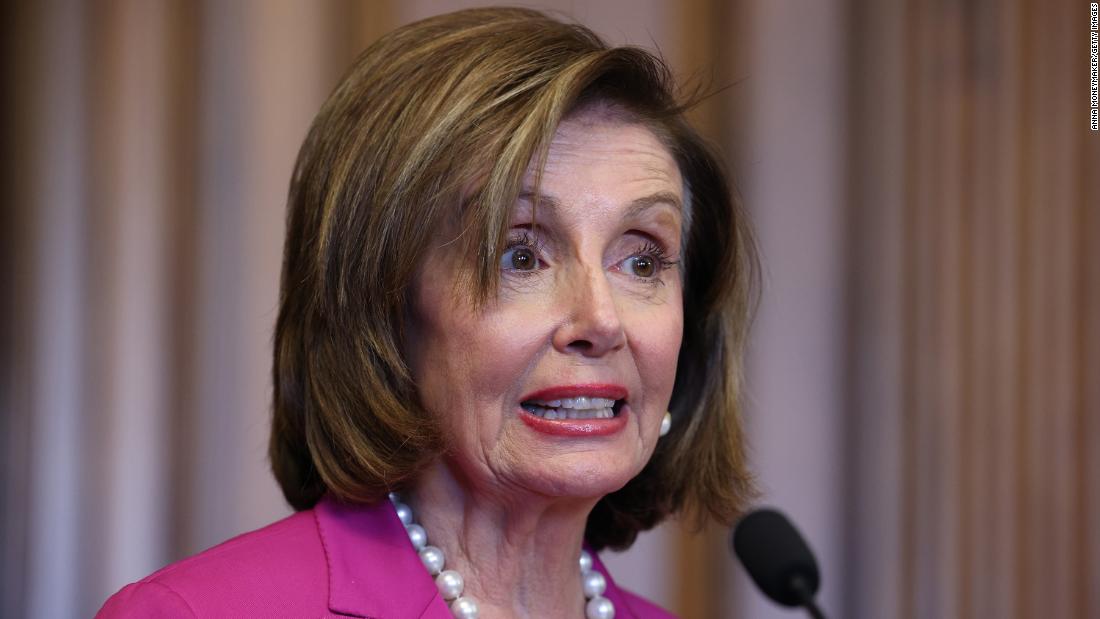
(CNN)House Speaker Nancy Pelosi is signaling that she won't be backed into a corner next week by moderates in her caucus who are refusing to back a budget agreement unless the speaker first allows a vote on the bipartisan infrastructure bill.
It's the first warning sign of a growing rift among Capitol Hill Democrats that could threaten President Joe Biden's infrastructure agenda and reveal deep schisms within the party's ranks. But it's also just the beginning of a months-long effort to pass two major legislative packages that were always going to be a high-wire act for the President and his allies on Capitol Hill.
Behind the scenes, the speaker is digging in. In a private caucus call Tuesday with the Democratic caucus in the House, leadership stood by their plan for next week telling the caucus that they still would force a vote on the budget, but not a vote on the underlying Senate-passed infrastructure bill as a handful of moderates wanted. It's further a sign that Pelosi is daring moderates to vote against her and face the wrath of their fellow members and outside groups.
During the call, Pelosi made a point to thank House Chairman of Transportation and Infrastructure Peter DeFazio who recently sent a letter urging his Democratic colleagues to come together and support the budget resolution when the House comes back into session next week.
Pelosi has made clear for months that the House won't take up the bipartisan deal until the Senate has also passed a more sweeping social spending package through budget reconciliation, a plan that comes as progressives have vowed not to back the bipartisan bill on its own without the social spending package.
It's a sign of a speaker who allies say won't be controlled by the whims of the fringes of her caucus. And sticking with her position now sends a strong signal later that threatening Pelosi doesn't work, no matter what side of the caucus a lawmaker is on. It's a strategy that will be essential if Pelosi is going to shepherd the President's agenda through a narrowly divided House where progressives and moderates have conflicting views of how big government should be in the waning months of the pandemic.
In the short term and with a narrow majority, Pelosi's resolve could leave her without the votes next week when the House returns to vote on the $3.5 trillion budget, but Pelosi has also made clear that bending to the moderates' demands of bringing the bipartisan bill to the floor would also fail to pass in the House of Representatives because of progressive opposition.
On Tuesday's Democratic caucus call, House Majority Leader Steny Hoyer told members that the rules for budget resolution, the bipartisan Senate infrastructure deal and HR 4, the John Lewis Voting Rights Act, will be voted on Monday night when the House returns, according to a source on the call.
Hoyer then said that final passage of the budget resolution and H.R. 4 would likely be on Tuesday.
In the wake of the demand from moderates, Pelosi announced that she had asked the Rules Committee to "explore the possibility" of a rule that would advance the budget resolution and the bipartisan infrastructure package. The rule vote is a procedural vote, however, and marks just one hurdle to be cleared prior to final passage of either measure.
Moderates responded to the news over the weekend by reiterating that they want to first vote on the bipartisan bill before moving on to the budget resolution.
Hoyer addressed the simmering divisions on the call Tuesday, saying, according to a source on the call. "I know that we have some arguments about who goes first, and the fact of the matter is that we will be doing all of the above. And it has been clear in the Senate, House and White House that we will be doing all of the above and I am hopeful that we will all vote for the rule Monday night," he said.
Majority Whip Jim Clyburn also urged unity, saying, according to the source, "I would hope that none of us, that none of us, would do or say anything that would jeopardize passing these bills. These bills are critical for us maintaining our majority, and that must reign supreme."
Pelosi has always said her strategy is to first bring up a $3.5 trillion budget resolution to instruct the relevant committees to write a massive social programs bill that includes an extension of the Child Tax Credit, an expansion of health care services, paid time off and tax increases on corporations and wealthy individuals who make more than $400,000 a year. Only then would Pelosi plan to bring the bipartisan bill to the floor for a vote.
The strategy was long intended to be a trust fall for both wings of her party. The moderates go along with the Democratic-only proposal to get a vote on the bipartisan bill and the progressives vote for the scaled-down bipartisan bill to get their larger package through the House.
The major internal divisions emerging now present a real challenge for Democratic leadership and underscore how difficult it will be to enact Biden's major priorities on infrastructure and expanding the social safety net with such a narrow Democratic majority in Congress. The effort to pass both packages also presents a test of how far each ideological wing of the party -- moderates and progressives -- are willing to go in order to put pressure on leadership, and how far they will take the emerging standoff.
This story has been updated with additional developments Tuesday.
"strategy" - Google News
August 17, 2021 at 10:44PM
https://ift.tt/3snbqka
House Democrats face major divisions over infrastructure strategy - CNN
"strategy" - Google News
https://ift.tt/2Ys7QbK
https://ift.tt/2zRd1Yo
Bagikan Berita Ini














0 Response to "House Democrats face major divisions over infrastructure strategy - CNN"
Post a Comment